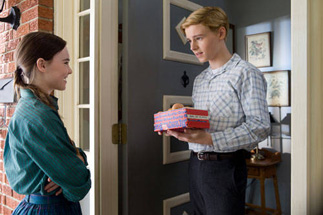Movie Review: Flipped
By Matthew Huntley
August 10, 2010
BoxOfficeProphets.com

The movie has been directed and co-written by Rob Reiner, working from the novel by Wendelin Van Draanen. As a filmmaker, Reiner is no stranger to this era. His Stand by Me (1986), based on the novel by Stephen King, took place in 1959 and centered on four adolescent boys searching for a dead body. That film had darker and more dramatic overtones, and although Flipped isn’t as emotionally gripping or serious, its subject is also lighter. Key to the movie’s success is the way Reiner makes the story about its people and not about its time. He could have easily succumbed to the temptation of showing off the qualities that place it in the 1960s - the sets, the costumes, the soundtrack - but he uses these elements only as atmosphere and humor while making the story more character-driven.
The characters are Juli Baker (Madeline Carroll) and Bryce Loski (Callan McAuliffe), two names that just sound inherently familiar. They meet when Bryce and his family move in across the street, the summer before he and Juli start second grade. For the next five years, Juli throws herself at Bryce hoping she’ll get a kiss, but Bryce spends those same years trying to avoid her. Every situation that’s experienced by both Juli and Bryce is told twice from each kid’s unique perspective. Fortunately, these perspectives are different and interesting enough that the film doesn’t feel redundant. It helps that Carroll and McAuliffe are so pure and charming, so much that we really listen to their dialogue, even if it is a tad simplified.
As with many coming-of-age tales, Flipped throws in some familiar childhood moments, like climbing trees and fighting for what you believe in; feeling so nervous about dinner with the opposite sex that you don’t know what shirt to wear; and learning something unique about your family history. The movie will likely remind viewers of The Wonder Years, but given the caliber of that TV series, that can only be a good thing.
Just as Juli and Bryce experience growing pains, their parents struggle with acceptance and responsibility. Juli’s father (Aidan Quinn) is a painter who invests most of his money into caring for his retarded younger brother (Kevin Weisman). He probably feels that spending money on him will lessen the guilt he feels for turning out normal. Juli’s mother (Penelope Anne Miller) copes with the family’s financial troubles and longs for the day when they can put themselves ahead of others.
Bryce’s father (Anthony Edwards) is an outspoken cynic, but it’s obvious he’s only hiding his own sadness and regret, while his mother (Rebecca De Mornay) is starting to feel smothered by her husband’s pessimism. The most sensible person in Bryce’s family is his wise grandfather (John Mahoney). He’s grief-stricken by his wife’s death but finds new purpose in trying to bridge the gap between the Bakers and the Loskis, despite their class differences.
As I watched Flipped, I remember thinking it was safe and entertaining but of no real importance. On the surface, it lacks the drama and efficacy of other coming-of-age stories like My Girl and the aforementioned Stand by Me. In hindsight, though, it’s not as superficial as it appears. The movie brings up some heavy issues like judging one’s neighbor, honoring your parents and respecting the things that make us all different. These are very broad points and the movie doesn’t have time to properly deal with them during its 90-minute run time, at least not enough to be compelling, but it does take them seriously and they ripple in our minds afterward. Just because they’re simplified doesn’t mean they’re not important or long-lasting.
If Flipped was longer and focused more on its two main characters, it probably would have been more introspective and significant (it introduces its supporting characters too randomly and doesn’t fully develop them), but I enjoyed it for its sincerity and warm heart. It defies being cheesy because the filmmakers and cast take the material seriously. Underneath its quaint façade are deeper issues that aren’t readily apparent, which goes along with its main theme: until we really talk to someone and commit ourselves to knowing them, thus looking beyond their superficial qualities and the hearsay of others, we won’t really know the truth outside our own perspective. Flipped knows this is a timeless lesson for both kids and adults.